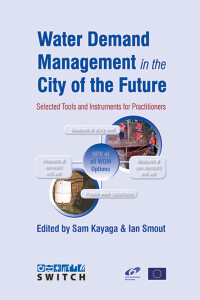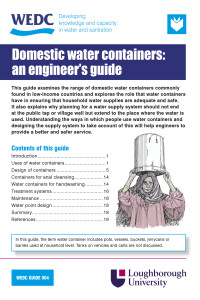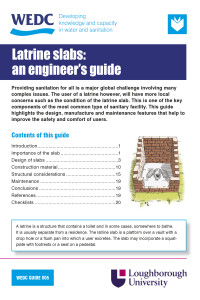Water, Sanitation and Hygiene
-
SODIS - Solar Water Disinfection
This document looks at issues surrounding clean drinking water and a simple and low-cost solution called SODIS, where the heat and UV rays from the sun fall on water in plastic bottles, killing patho-genic micro-organisms.
-
Urine Diverting Dehydration Toilet (UDDT)
The majority of communities worldwide pollute ground water resources and the environment as a result of flush toilets.
-
Operation and Maintenance of Water and Sanitation Infrastructure
The training module developed for sanitation and hygiene education
-
A Practical Guide for Building a Simple Pit Latrine
A step by step guide to the construction and use of a simple toilet.
-
Water Demand Management in the City of the Future: Selected tools and instruments for practitioners
This book presents examples of tools and instruments that can be adapted by urban water professionals to mainstream WDM in the cities' strategic planning process.
-
An Engineer's Guide to Domestic Water Containers
This booklet examines the range of domestic water containers commonly found in low-income countries and explores the role that water containers have in ensuring that household water supplies are adequate and safe. It also explains why planning for a water supply system should not end at the public t...
-
An Engineer's Guide to Latrine Slabs
Providing sanitation for all is a major global challenge involving many complex issues. The user of a latrine however, will have more local concerns such as the condition of the latrine slab. This is one of the key components of the most common type of sanitary facility. This booklet highlights the...
-
Shit Matters
Sanitation remains one of the biggest development challenges of our time, and a long neglected issue associated with taboos and stigma. Despite growing attention and efforts, many top-down approaches to sanitation have failed, reflecting that simply providing people with a toilet does not necessaril...
-
Decentralised Wastewater Treatment Systems
In many countries, a rapidly upcoming demand for decentralised wastewater treatment systems (DEWATS) and a demand for efficient community-based sanitation (CBS) can be observed. DEWATS is designed to be an element of a comprehensive strategy for city-wide planning and sustainable infrastructure deve...
-
Greywater Use in the Middle East
Stephen McIlwaine, Mark Redwood
In water-scarce areas of the Middle East, greywater (household wastewater excluding toilet waste) is commonly used by poor communities to irrigate home gardens. This both supplements the water available to the household and improves food security. This book draws together material presented at a con...










